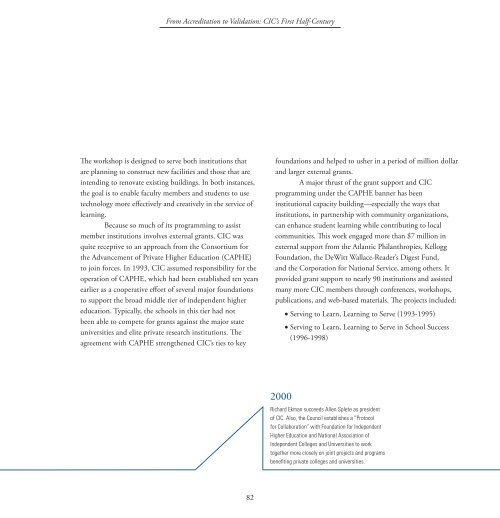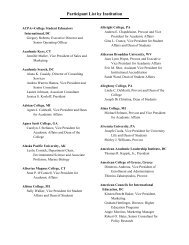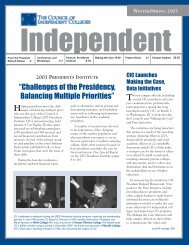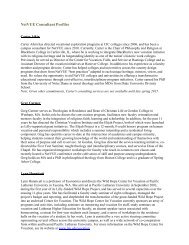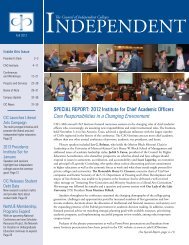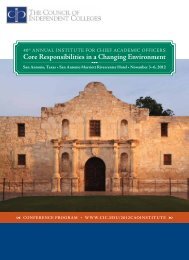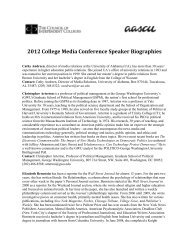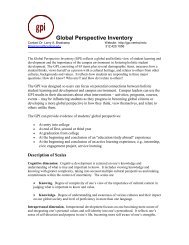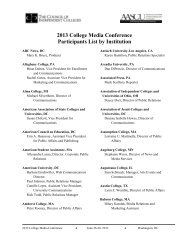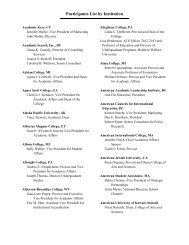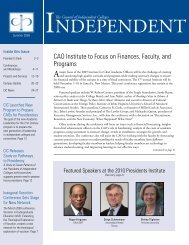Meeting the Challenge: - The Council of Independent Colleges
Meeting the Challenge: - The Council of Independent Colleges
Meeting the Challenge: - The Council of Independent Colleges
You also want an ePaper? Increase the reach of your titles
YUMPU automatically turns print PDFs into web optimized ePapers that Google loves.
From Accreditation to Validation: CIC’s First Half-Century<br />
<strong>The</strong> workshop is designed to serve both institutions that<br />
are planning to construct new facilities and those that are<br />
intending to renovate existing buildings. In both instances,<br />
<strong>the</strong> goal is to enable faculty members and students to use<br />
technology more effectively and creatively in <strong>the</strong> service <strong>of</strong><br />
learning.<br />
Because so much <strong>of</strong> its programming to assist<br />
member institutions involves external grants, CIC was<br />
quite receptive to an approach from <strong>the</strong> Consortium for<br />
<strong>the</strong> Advancement <strong>of</strong> Private Higher Education (CAPHE)<br />
to join forces. In 1993, CIC assumed responsibility for <strong>the</strong><br />
operation <strong>of</strong> CAPHE, which had been established ten years<br />
earlier as a cooperative effort <strong>of</strong> several major foundations<br />
to support <strong>the</strong> broad middle tier <strong>of</strong> independent higher<br />
education. Typically, <strong>the</strong> schools in this tier had not<br />
been able to compete for grants against <strong>the</strong> major state<br />
universities and elite private research institutions. <strong>The</strong><br />
agreement with CAPHE streng<strong>the</strong>ned CIC’s ties to key<br />
foundations and helped to usher in a period <strong>of</strong> million dollar<br />
and larger external grants.<br />
A major thrust <strong>of</strong> <strong>the</strong> grant support and CIC<br />
programming under <strong>the</strong> CAPHE banner has been<br />
institutional capacity building—especially <strong>the</strong> ways that<br />
institutions, in partnership with community organizations,<br />
can enhance student learning while contributing to local<br />
communities. This work engaged more than $7 million in<br />
external support from <strong>the</strong> Atlantic Philanthropies, Kellogg<br />
Foundation, <strong>the</strong> DeWitt Wallace-Reader’s Digest Fund,<br />
and <strong>the</strong> Corporation for National Service, among o<strong>the</strong>rs. It<br />
provided grant support to nearly 90 institutions and assisted<br />
many more CIC members through conferences, workshops,<br />
publications, and web-based materials. <strong>The</strong> projects included:<br />
• Serving to Learn, Learning to Serve (1993-1995)<br />
• Serving to Learn, Learning to Serve in School Success<br />
(1996-1998)<br />
2000<br />
Richard Ekman succeeds Allen Splete as president<br />
<strong>of</strong> CIC. Also, <strong>the</strong> <strong>Council</strong> establishes a “Protocol<br />
for Collaboration” with Foundation for <strong>Independent</strong><br />
Higher Education and National Association <strong>of</strong><br />
<strong>Independent</strong> <strong>Colleges</strong> and Universities to work<br />
toge<strong>the</strong>r more closely on joint projects and programs<br />
benefiting private colleges and universities.<br />
82


